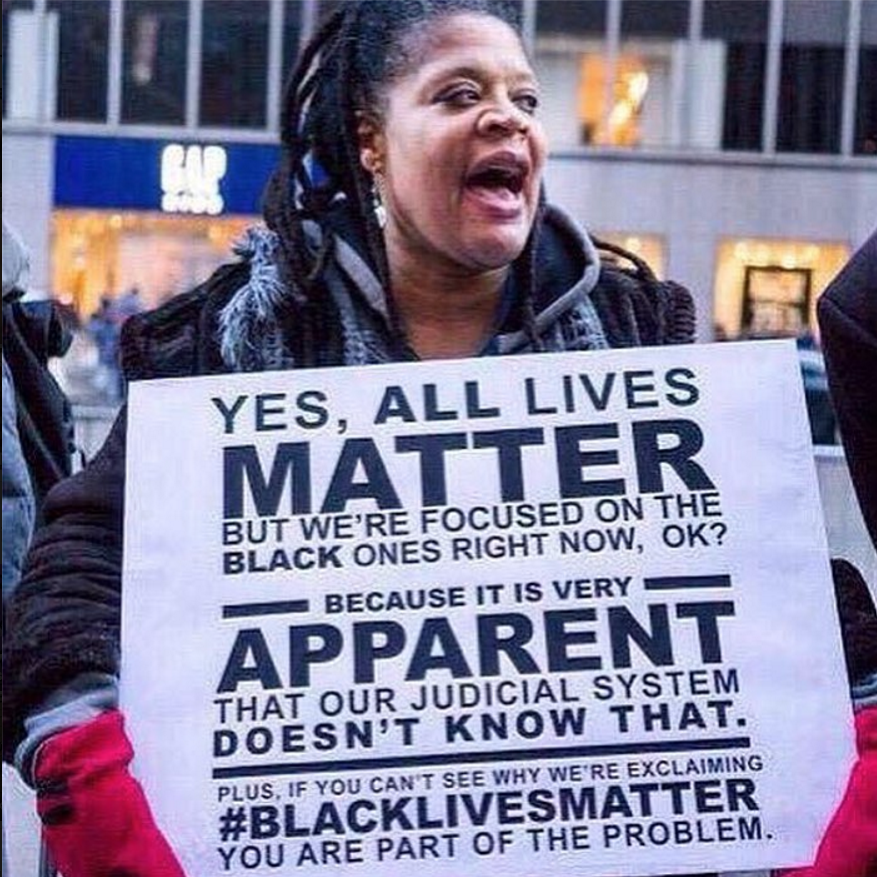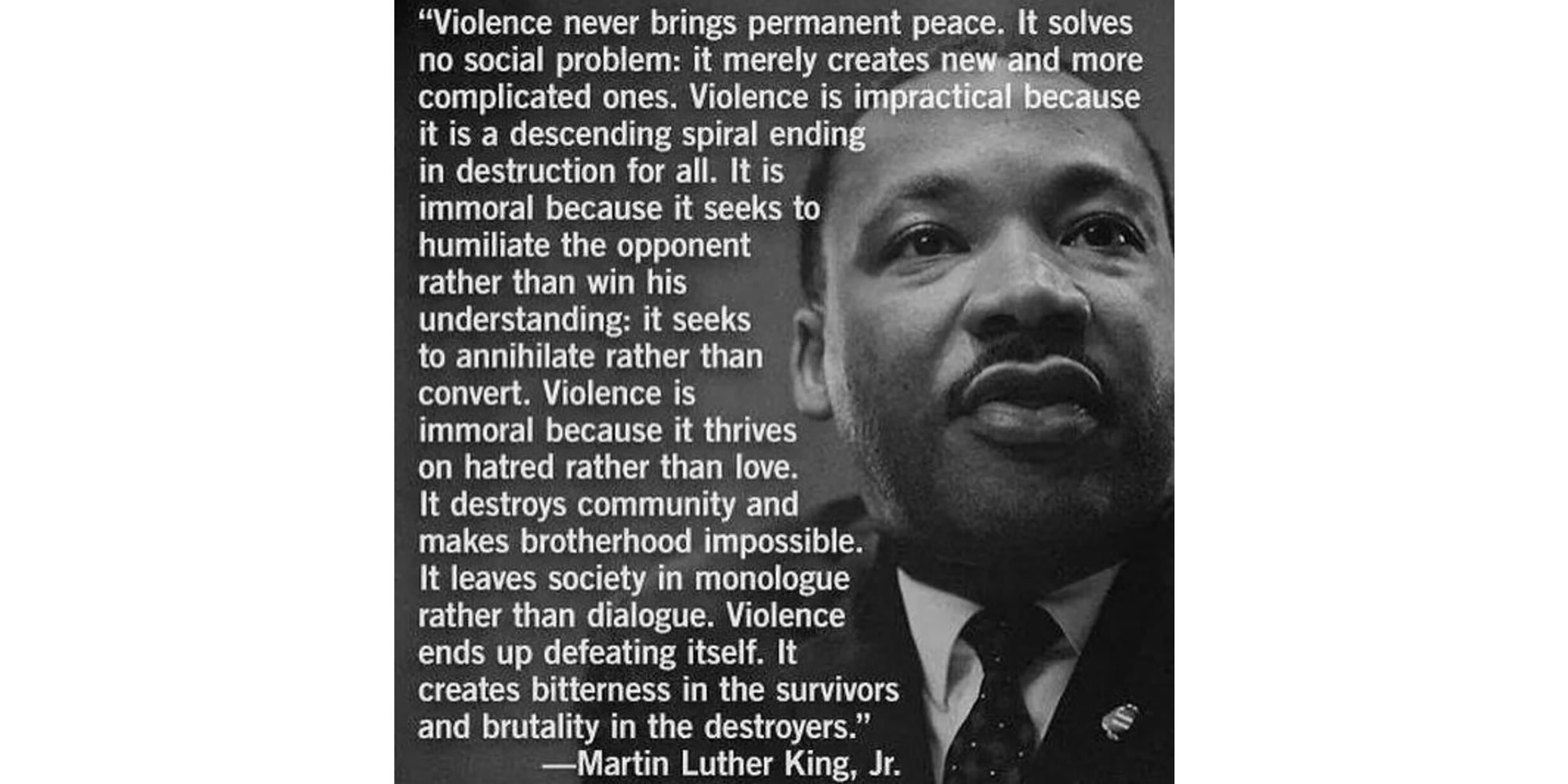“I dont have a racist bone in my body!” A phrase I’ve heard dozens of white people utter on the subject of racism, which they think little about. What’s racism?
Racism: the belief that all members of each race possess characteristics or abilities specific to that race, especially so as to distinguish it as inferior or superior to another race or races.
We all play a role whether we know it or not, and we all can afford to be a part of the dream for something BETTER. The trouble seems to be this: the hope for better comes at the ‘cost’ that those with less may get a bit more (or getting what we all deserve.) Doesn’t sound like an issue at first, but watch how white conservatives decry the ‘Black Lives Matter’ campaigns, met with dissent from ‘All Lives Matter’ counter campaigns. They’re either grossly out of touch or racist. Maybe a bit of both?
We all have deeply seated presumptions predicated on race (and other things, namely socio-economics) which must be confronted as we lean into better.
We are ALL a product of racism whether we’re aware of it or not. Generally, you’re one of either a beneficiary or a victim of racism through avenues like legislation, culture, the economy, and policies built to favour certain people. So if you’re not aware, become aware of how systems in play affect you. Racism by definition is easy to understand, it’s black and white (no pun intended), but comprehending how pervasive and complex the problem is takes effort.
When Black Lives Matters decry a system and police brutality, they aren’t calling everyone a racist nor are they suggesting only Black Lives Matter. They are calling out policies and policing that have, over time, lead to the direct oppression of a specific people group identified based on the pigment of their skin. If you’re not a part of the oppressed group, you cannot share in the experience, and in the least, have to be mindful of how you form your opinions.
Instead of acknowledging the problem what cropped up instead? #AllLivesMatter. A response largely built out of privilege and ignorance to the systemic issue that actually deflects from the key issue of inequality based on race. #AllLivesMatter is the , “insensible cry of a body that has grown numb to its self“ Counter protesting BLM (or let’s say Occupy before them) with a red herring argument of #AllLivesMatter is a continuation of the subtle oppression of a minority voice.

A Redditor explains:
Imagine that you’re sitting down to dinner with your family, and while everyone else gets a serving of the meal, you don’t get any. So you say “I should get my fair share.” And as a direct response to this, your dad corrects you, saying, “everyone should get their fair share.” Now, that’s a wonderful sentiment — indeed, everyone should, and that was kinda your point in the first place: that you should be a part of everyone, and you should get your fair share also. However, dad’s smart-ass comment just dismissed you and didn’t solve the problem that you still haven’t gotten any!
The problem is that the statement “I should get my fair share” had an implicit “too” at the end: “I should get my fair share, too, just like everyone else.” But your dad’s response treated your statement as though you meant “only I should get my fair share”, which clearly was not your intention. As a result, his statement that “everyone should get their fair share,” while true, only served to ignore the problem you were trying to point out.
…
Just like asking dad for your fair share, the phrase “black lives matter” also has an implicit “too” at the end: it’s saying that black lives should also matter. But responding to this by saying “all lives matter” is willfully going back to ignoring the problem. It’s a way of dismissing the statement by falsely suggesting that it means “only black lives matter,” when that is obviously not the case. And so saying “all lives matter” as a direct response to “black lives matter” is essentially saying that we should just go back to ignoring the problem.
Why would we intentionally ignore the problem or deflect its message? Are we so disconnected from the issue due to our privilege that we actually believe BLM will take something away from us? Does our lack of empathy to see the world through a different lens occur because we’re afraid of any privilege we may lose?
Maybe our lenses need cleaning?
Kinds of Racism
Part of the confusion may be alleviated by making a necessary distinction. This comes directly from repeatedly hearing white people state they’ve been victims of racism and therefore a) can empathize, b) can’t understand why Black Lives Matters (or Occupy for indigenous people in Canada) should be given attention (we’ve already gone full circle). Here are two necessary distinctions to consider regarding the forms of racism (and I’m not a sociologist so forgive me if I’m using incorrect terminology).
Institutional (systemic) racism is where the privileged have exercised and benefitted from a systemic form of racism. Systemic means the entire system from the highest levels of authority all the way down through society are built to oppress a particular race or races. If you are white you are an unequivocal beneficiary of institutional racism whether you’re aware or want to acknowledge it or not. You may not be a racist, but you have benefited from institutional racism and everything that goes along with it.
You may not even know it, but this form of racism has built and is a part of our society today. It’s a system that’s enabled privilege to be extorted from one group for the benefit of the next. It’s why white people, without missing a beat, can decry, “he should’ve just OBEYED orders,” when addressing police shootings on black males. Sure, he should have listened to the officer in authority, which in an ideal world works, but,
the playing field isn’t equal
White males don’t have a fear of being wrongfully incarcerated or, worse yet, shot and killed. What is normative to white males is simply not the lens of anyone else.
Another way to ignore institutional racism is to turn the tables.
Situational or Individual Racism
“Reverse racism” is now in our lexicon suggesting minority race groups can target privileged ones. It’s partly true. Black people can be racist to white people because they are white, anybody can be racist to another race. It’s violent and should never be ignored nor does it help a particular cause. However, ‘reverse racism’ ignores the root cause. Black people (or indigenous people or whomever), cannot be ‘institutionally’ racists towards white people. There are no policies at any government level that subjugates white skin.
To use the BLM campaign again to explain institutional and individual, Black Lives Matters is calling out institutional injustice, All Lives Matters is a response by individuals disconnected from the experience of a systemic problem.
We are so steeped in our own shame of not knowing or believing we have worth outside our accomplishments and skin colour, that we can’t see past our own inadequacies to acknowledge the oppression of others.
We meet #blacklivesmatter with “all lives matter” because we don’t even feel our own worth enough to see what’s right before our eyes. We are so consumed with our pain, with our shame, that we can only focus on separating us from them. We think the only way to prove our worth is to step on anyone beneath us to lift ourselves up.
But we’ve missed the point. Elevating ourselves through pain and shame will never free us. – Jenn from Cry and Nurse On
How can we respond? In the least say, “I don’t know,” or “I could never imagine” because you can’t. “How can I learn or be a part of the solution of reconciliation?” that’s an exceptional response. There are paths of reconciliation, and it begins with us, individually and within community.
Scarce on Love
In a culture of scarcity (over abundance), what we have is never enough, and on top of that, if we catch others getting more than what they had, even if it’s still less than us, we work against their increase. Our individualism needs to be challenged at the heart–our own idols of consumerism. I want to argue there’s something even deeper than racism that’s plaguing the country–it’s poverty. (The same systems in play that exacerbate the race problem, are directly correlated to the poverty problem.) Different races usually get along so long as they come from the same privileged social stratosphere. The moment class privilege is challenged the wheels fall off. It’s a double whammy if you are poor and ethnic. Racism is tied to our fascination and ultimate love for materialism. Capitalism depends on the powerful remaining powerful under the guise that every individual could strive for their own entitlement and make it big. This way of thinking has left a select few better, and an increasing majority worse off.
In a system of scarcity the pursuit is for more stuff. Would it look different if we turned our outlook of scarcity into abundance? What would it look like if we saw a scarcity of love rather than our scarcity of stuff?
I’m scarce on love, I know that, and I try, in the context of community, to choose better.
The community must stand united. ‘How?’ is the inevitable question.
How can we fix poorly trained police forces?
How do we address the economic system that plagues the already poor with systemic barriers?
How do we address the cultural fascination with guns and violence?
Can we find a change where the dream for better tomorrow inspires generations that hope again today? We’ve read and seen the distortion, can we reach for the possibilities for better?
Right now the system is broken which merely highlights the deeper problem: we are broken. We are in desperate need for restoration. You and I need restoring. The journey to confront racism, poverty, injustice, begins with seeing our own brokenness and assumptions around these issues. This is difficult to embody the greater your privilege because there’s more to lose.
Who will take the chance and chase beauty? Who will be the reconcilers?
For the Christians, and to all, we need to live our lives in a deeper way. Jesus provides a template of what that could look like:
Blessings on the poor in spirit! The kingdom of heaven is yours.
Blessings on the mourners! You’re going to be comforted.
Blessings on the meek! You’re going to inherit the earth.
Blessings on people who hunger and thirst for God’s justice! You’re going to be satisfied.
Blessings on the merciful! You’ll receive mercy yourselves.
Blessings on the pure in heart! You will see God.
Blessings on the peacemakers! You’ll be called God’s children.
Blessings on people who are persecuted because of God’s way! The kingdom of heaven belongs to you.
We’re all scarce on love, but lucky there’s a different way, a new story of conviction and hope that declares: all of these wrongs will be turned right. The story is being told now.

